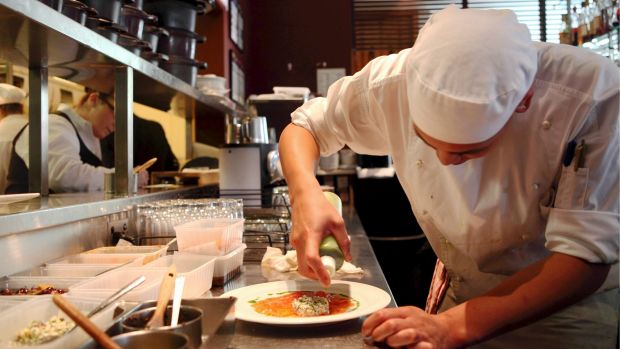Hundreds of thousands of Australians who work on Sundays will have their take-home pay slashed after a landmark ruling by the national workplace umpire.
The Fair Work Commission on Thursday morning announced Sunday penalty rates paid in retail, fast food, hospitality and pharmacy industries will be reduced from the existing levels, which, in some cases, are as much as "double time". Most of the pay cuts take effect from July, and some will be phased in over time.
More National News Videos
IN FULL: Penalty rate changes
Find out how paypackets will be affected for people working weekends in hospitality, fast food, retail and pharmacy industries.
Full-time and part-time workers in retail will have their Sunday penalty rates dropped from 200 per cent to 150 per cent of their standard hourly rate, while casuals will go from 200 per cent to 175 per cent.
Hospitality employees will face a reduction in Sunday pay from 175 per cent to 150 per cent, while casual hospitality workers' pay will remain unchanged.
Fast-food employees' Sunday rates will go from 150 per cent to 125 per cent for full-time and part-time staff, and casuals will go from 200 per cent to 175 per cent.
Holiday penalty rates for full-time and part-time employees in hospitality and retail will also be slashed from 250 per cent, or "double-time and a half", to 225 per cent.
However, the changes do not extend to restaurants and cafes as industry representatives did not provide enough evidence to convince the workplace umpire of their case. However, restaurant employer groups have the opportunity to try to mount another case.
'Greatest cut to wages since the Great Depression'
The controversial decision to cut has angered Australia's union movement, which has invested heavily in a massive campaign to safeguard weekend penalty rates across the country.

"This is a bad day for working Australians," said Australian Council of Trade Unions president Ged Kearney. Struggling workers "won't be able to survive on a 25 or 30 per cent pay cut".
"We are on the way to seeing a whole class of working poor in this country," she said. "We are talking about people who do not earn a fortune. The retail industry made a very healthy operating profit last year. They can afford to pay people decently."

Ms Kearney said the cuts to penalty rates "have to be stopped" and urged all political parties to "step up and say they will protect workers' take home pay today".
She said more than a million workers will face a pay cut of more than 20 per cent, or $6000 per year.
"Imagine what that means to someone when they have to pay car registration, they have to pay rent, when they are trying like crazy to get a mortgage" she said.
With rising inflation, falling wage growth and unaffordable house prices, Victorian Trades Hall Council secretary Luke Hilakari warned the decision would push working families into severe hardship.
"There will be thousands and thousands of families sitting around the dinner table tonight, working out how to make ends meet. Are they going to have to take a second job, or a third job? Are they going to have to do extra shifts?" he said.
"This is going to be the greatest cut to working people's wages since the Great Depression."
Jo-anne Schofield, the national secretary for the union representing hospitality workers, said Prime Minister Malcolm Turnbull could have intervened to prevent cuts to the country's lowest paid workers.
"Let's be clear that this has happened because the big business lobby has made an application to cut the pay of the lowest paid workers in the country. It didn't happen by accident," she said.
Dr Stephen Clibborn from the University of Sydney business school said underpayment of wages and penalty rates is prevalent in retail and hospitality jobs.
"Without effective enforcement of award pay and conditions, today's decision must be viewed to some extent in a bubble, separate from the reality of our labour market," he said.
Adjusting to the 24/7 economy
In the lead-up to the decision, union leaders have argued that Sunday loadings of up to 200 per cent were crucial compensation for low-paid employees who sacrifice weekends and work unsociable hours.
Employer groups have been pushing for years for a reduction to penalty rates on Sundays, which they say are too high, no longer reflect community standards and are forcing businesses to close their doors on weekends and public holidays.
They claim a higher wage for Sunday staff is no longer justified in a 24/7 economy, where workers see no difference in working Sundays compared to Saturdays.
Handing down the decision on Thursday morning, Fair Work Commission president Iain Ross said the existing weekend and public holiday penalty rates did "not achieve the modern awards objective, as they do not provide a fair and relevant minimum safety net".
He said the Fair Work Commission had decided against employers' requests to drop Sunday rates to the same level as Saturdays though because working on Sundays still came at a higher level of inconvenience for employees than on Saturdays, even if it wasn't as pronounced as in the past.
The umpire has spent almost two years weighing evidence from more than 140 witnesses and 6000 written submissions.
The Australian Industry Group welcomed the decision as better aligning penalty rates in the fast food industry to the needs of 21st century workplaces.
Its chief executive Innes Willox said a high proportion of employees in the fast food industry were young people who had study commitments during normal business hours.
"The Commission accepted AI Group's evidence that young people often prefer to work in the evenings and on weekends, and that many prefer to work on Sundays rather than Saturdays," he said.
"In the fast food industry, weekends and evenings are peak times. The Commission has recognised that existing Sunday penalty rates in the fast food industry are not fair for employers and no longer relevant."
'Body blow to hundreds of thousands'
Pressure for a reduction to penalty rates had increased since Australia's Productivity Commission in 2015 recommended cutting Sunday rates in line with Saturdays.
Although Mr Turnbull has previously referred to Sunday penalty rates as an outdated concept, the federal government has left reform on the issue to the independent umpire, the Fair Work Commission.
Labor leader Bill Shorten said the decision was what the Coalition had wanted for years.
"Turnbull and his MPs have been pushing to cut penalty rates for years - and now it's happened," he tweeted.
Earlier this week, he has flagged his party would "never support a decision that sees workers worse off".
"With wages growth at record lows and underemployment at record highs, there could not be a worse time to cut penalty rates," he said then, warning the ruling could set a precedent that could eventually cut weekend penalty rates for other occupations, too, such as nurses or paramedics.
Greens workplace relations spokesman Adam Bandt promised to introduce legislation to protect penalty rates for retail, fast food, hospital and pharmacy workers.
"This is a body blow to the hundreds of thousands of people who depend on penalty rates to make ends meet," he said.
Employment Minister Michaelia Cash said the opposition's scare campaign about an end to Sunday penalty rates had already begun.
"When it comes to the issue of penalty rates, Bill Shorten has a glass jaw," she said. ""He is the person solely responsible for the fact that the Fair Work Commission was reviewing penalty rates, and he needs to once and for all take responsibility for this decision.
"He can say what he likes today about the decision, but he does need acknowledge is his role in it and the fact that it is either an independent commission or it is not."
'Penalty on jobs'
Conservative Liberal backbencher Eric Abetz said the decision was a welcome step.
"The Fair Work Commission has clearly been mugged by the realities that their previous determination has cost jobs and investment in the hospitality, retail and tourism sectors," he said in a statement.
"Today's decision will be of benefit to the tens of thousands of young Australians who want to work on weekends who have increasingly found that businesses haven't been able to afford opening their doors on Sundays."
"It is somewhat disappointing that the Commission has taken more than three years to consider this matter and I will be seeking to establish why it took such an unusual amount of time."
Aaron Lane, a fellow at the Institute of Public Affairs, reckons the umpire's move will make weekend work more secure.
"Penalty rates are a penalty on jobs. The higher the penalty, the higher the barriers are into employment - putting the job market further out of reach for the most disadvantaged Australians," he said.
"There are businesses right around the country that have stopped trading on Sundays because penalty rates are prohibitively high. Case after case, we hear of family-owned small businesses that run on skeleton staff on a Sunday because they are unable to afford the extra penalty rates.
Creating more jobs?
James Pearson, chief executive officer of the Australian Chamber of Commerce and Industry, argued along the same lines, saying penalty rates had to be cut to make it easier for employers to take on new staff at a time when 725,000 people were out of work, including 259,000 young people.
"Reducing penalty rates for businesses in retail and hospitality will give them greater capacity to open their doors longer, take on more staff and give them more hours. The Restaurant and Catering Association found it could create 40,000 jobs," he said.
However, some employers in the hospitality industry who gave evidence at the Fair Work Commission hearings admitted it was unlikely they would put on more staff if penalty rates were reduced.
Citigroup late last year conducted financial analysis which found big retailers including Myer and JB Hi-Fi were likely to deliver any savings from penalty rate cuts to shareholders.
Former ACTU Assistant Secretary Tim Lyons, who is a research fellow at the think tank Per Capita, said the Citigroup report revealed that reductions in penalty rates would not save or create more jobs.
He said a lack of dollars in workers pockets was the problem, not a solution to housing affordability, sub-trend economic growth and tax revenue shortfalls.
"This is a very poor decision where the unrelenting attacks on penalty rates and the commission from government and employer groups seems to have played a role," he said.
"In reality, there is no evidence that this will result in more jobs or more hours for existing workers. It's just a pay cut for people that can't afford it."
Victorian Trades Hall Council's Mr Hilakari had even starker words to reject the business groups' claims the cuts would create jobs.
"They don't hire extra people out of goodwill," he said. "This money is just going to be pocketed."
with Tom McIlroy
Poll
You will need Cookies enabled to use our Voting Feature.
Is it a good decision to slash penalty rates?
Poll closes in 2 days.
Disclaimer: These polls are not scientific and reflect the opinion only of visitors who have chosen to participate.
Is it a good decision to slash penalty rates?
Poll closes in 2 days.
Disclaimer: These polls are not scientific and reflect the opinion only of visitors who have chosen to participate.
















596 comments
Comment are now closed